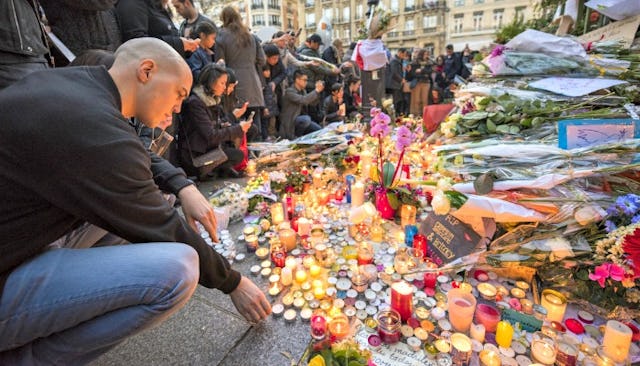What I Will Teach My Unborn Son After Being In Paris During The Attacks

On Friday, November 13, at 29 weeks pregnant, I took my first international flight (by myself) to Paris. My husband was on a business trip there, and I was meeting him for the weekend to have a short “babymoon.” We spent the day wandering the city—eating crepes and macaroons, marveling at the sights, and just enjoying our time away from home.
Megan Goers
At a late dinner that night, we were discussing the important decision of which dessert we should get when my phone buzzed. Someone had tagged me in their Facebook post of a news article, asking if I was OK. I had no idea what it was about. I quickly clicked on it and read that there had been some sort of shooting in Paris. I confirmed we were fine and informed my husband of the situation. It made us a little uneasy, but it seemed like it was possibly an isolated incident. It wasn’t.
By the time we got back to our hotel room, we had received numerous messages and texts and were frantically trying to let our parents know we were safe.
The stories kept coming. It wasn’t just one attack, but many. The numbers kept rising. We posted a status on Facebook to let everyone know we were indeed safe, or as safe as we could be. We stayed up until 3:30 a.m., watching the news and getting updates from back home. We really did feel safe.
It wasn’t until we said our goodnights and turned off the TV that the fear crept in. Sometimes, in the darkness and quiet, your fears become so loud. I didn’t know if we were truly safe or not. I cried. I cried over the possibility of not being able to see our family again and that I may not ever meet our baby boy. I cried for the people who I didn’t know, but hadn’t been as lucky as us. My husband held me tighter than he ever has before, admitting he was scared too, but trying to reassure me. I don’t think our love for each other or our unborn child had ever been as strong as it was that night.
The next day, we mostly stayed put in our hotel room, horrified by the number of lives lost or severely altered. I read article after article, hoping for answers to this evil. While there weren’t any answers to that, there were answers for good. I found out that Paris’s motto is “Fluctuat nec mergitur” (meaning, “tossed but not sunk”). We ventured outside for food throughout the day, and while the air felt somber, there was a defiance as well. Parisians were still sitting in cafes, going to the few open stores, and traveling the streets. Everyone we interacted with was still friendly, helpful and kind—maybe even more so than the day before.
By the end of the day, we were certain of one thing. Parisians truly were the embodiment of the city’s motto. Through our personal interactions and reading numerous stories of those who helped others, it was obvious. This city was resilient and strong.
When our son is old enough, I hope can instill the importance of this past weekend in him. We witnessed tragedy, but have never been so grateful for each other and felt so much love for our small family. We interacted with people whose lives were forever changed, and yet, they were unbreakable. Kindness and solidarity prevailed throughout the city. I won’t be able to shield my son from witnessing hate, evil and tragedy, but I hope I can teach him to learn from it—to find the good people quietly overcoming it. I hope that it can be an example of what he may someday be. Perhaps he can be the good helping to overcome evil. I hope he can be an embodiment of Paris’s motto. When life tosses him into the waves, he doesn’t sink. He fights. He is strong. He will not be broken.
Frederic Legrand – COMEO / Shutterstock
I know my life has forever been altered because of that day and the uncertainty we felt in an unknown area. Some people feel that every single day, even in their own homes. This tragedy is just one of many that occur on a daily basis around the world. I don’t want to take my safety and freedom for granted. I hope I can teach my son that as well. One thing I know for sure, I plan to live my life from now on trying to emulate Paris’s motto. I will not sink.
This article was originally published on